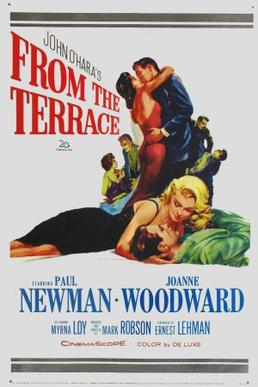In The Age Of “Mad Men”-Paul Newman and Joanne Woodward In John O’Hara’s From The Terrace
DVD Review
From The Pen Of Frank Jackman
From The Terrace, starring Paul Newman, Joanne Woodward, Ina Balin,
Sometimes, and it is the case here with the adaptation of John O’Hara’s saucy melodrama From The Terrace, a film, an older film, can provide a glimpse of what was going on in society at the time for both those who lived through it and those too young to have known about the times first hand. Part of the success of the recently ended series, Mad Men, was that viewers were interested in taking a retro look back at the early 1960s before the big counter-cultural splash tore American society asunder. You know the age of Ike, the age of conformity, and in retrospect the “golden age” of the American worker before the “race to the bottom” hit full stride. From The Terrace covers a lot of that same territory, the part about making it big in America, about making a name for yourself with hard work, ruthlessness, and some chutzpah. Some of that ethos obviously still exists now but the “rewards” for many, like the protagonist of this film, Alfred Eaton (played by Paul Newman) have lost their luster.
Here is the skinny. In the age of Ike (and you knew you were in the age of Ike with all the guys, the Wall Street guys anyway, wearing soft hats to work and expensive nicely tailored overcoats in inclement weather to boot) there was money and reputation to be made by those men who survived the rigors of World War II (and it was mainly men since women were expected to stay home with the kids in Middle America or as in this film with Mary, Alfred’s initial love interest played by Joanne Woodward , spend their time looking beautiful if from the upper crust) and had a little luck and skill. That was the case with one Alfred Eaton who wanted to get out from under plodding along working his way up in his father’s mill (and his father’s obsession with a dead brother to the exclusion of any human feeling for him). And so he goes out on his own, first with a fellow veteran in an aircraft business then after a fortuitous event a high end job at a big time Wall Street financial firm with nothing to stop him from rising to the top except his own desires.
Typical Wall Street success story, right? Well yes but remember this is a John O’Hara story. O’Hara cut his teeth on chronicling the lives, read sex lives, of the upper crust in places like Pennsylvania and New York beginning with his classic Appointment at Samarra so that is not the end of the tale by any means. Of course there has to be a love interest or here more than one. Number one is the classic match-up of the “unapproachable” rich girl of Alfred’s dreams (and entre into high society) whom he is able to seduce and marry. But a guy on the way up has to give up things, mostly time for personal relationships and so Mary gets short shrift. But Mary is a fussy young woman and wants companionship anyway she can get it once it is clear that Alfred is driven by success and not by her bedroom eyes. So she wanders, works her way into a little off-hand adultery. Of course that is a problem, a big problem in publicity conscious 1950s high finance where formally stable marriages are a given. Divorce and known adultery are the kiss of death for the young and ambitious on that high road to success whatever else is involved. So Alfred is a very unhappy man who knows he has made a wrong choice in the wife department.
And not just in the wife department as the story unfolds since he begins to have a personal crisis of conscience brought on by an attraction to a gal from Podunk (played by Ina Balin) whose wholesomeness and grounded-ness contrasts with Alfred’s whole bloody lifestyle. But our boy gets “religion,” gets it big when he has the brass ring right in his fingers-and just walks away, walks away the “Street” for whatever bucolic life is in store for him. Mary, well, the Marys of the world land on their feet so don’t cry for her. If you want a glimpse at what high society, its mores, and its hypocrisies looked in the 1950s including now seemingly strange ideas about marriage, divorce, ethical standards and just doing the right thing this while not a great story line when the deal goes down since it was not a great O’Hara story but one in a line of many along the same lines will give you an idea.

No comments:
Post a Comment